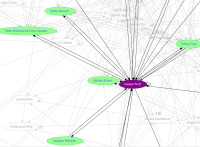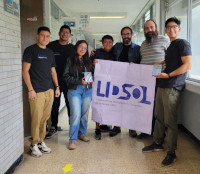As an academic, I have cheered for and welcomed the open access (OA) mandates that, slowly but steadily, have been accepted in one way or another throughout academia. It is now often accepted that public funds means public research. Many of our universities or funding bodies will demand that, with varying intensities–sometimes they demand research to be published in an OA venue, sometimes a mandate will only “prefer” it. Lately, some journals and funder bodies have expanded this mandate toward open science, requiring not only research outputs (that is, articles and books) to be published openly but for the data...
Gunnar Wolf - Nice grey life - page 4
Showing posts 31 – 40
 As DebConf22 was coming to an end, in Kosovo, talking with Eeveelweezel they invited me to prepare a talk to give for the Chicago Python User Group. I replied that I’m not really that much of a Python guy… But would think about a topic. Two years passed. I meet Eeveelweezel again for DebConf24 in Busan, South Korea. And the topic came up again. I had thought of some ideas, but none really pleased me. Again, I do write some Python when needed, and I teach using Python, as it’s the language I find my students can best cope with....
As DebConf22 was coming to an end, in Kosovo, talking with Eeveelweezel they invited me to prepare a talk to give for the Chicago Python User Group. I replied that I’m not really that much of a Python guy… But would think about a topic. Two years passed. I meet Eeveelweezel again for DebConf24 in Busan, South Korea. And the topic came up again. I had thought of some ideas, but none really pleased me. Again, I do write some Python when needed, and I teach using Python, as it’s the language I find my students can best cope with....The relational model is probably the one innovation that brought computers to the mainstream for business users. This article by Donald Chamberlin, creator of one of the first query languages (that evolved into the ubiquitous SQL), presents its history as a commemoration of the 50th anniversary of his publication of said query language. The article begins by giving background on information processing before the advent of today’s database management systems: with systems storing and processing information based on sequential-only magnetic tapes in the 1950s, adopting a record-based, fixed-format filing system was far from natural. The late 1960s and early 1970s...
Understanding the free and open-source software (FOSS) movement has, since its beginning, implied crossing many disciplinary boundaries. This article describes FOSS’s history, explaining its undeniable success throughout the 1990s, and why the movement today feels in a way as if it were on autopilot, lacking the “steam” it once had. The author presents several examples of different industries where, as it happened with FOSS in computing, fundamental innovations happened not because the leading companies of each field are attentive to customers’ needs, but to a certain degree, despite them not even considering those needs, it is typically due to the...
 For many years, I have been using the dlvr.it service to echo my online activity to where more people can follow it. Namely, I write in the following sources: My blog (where this content is being posted to) → RSS Mostly academic publications I send to my university’s repository (including conference presentations and the like) → RSS Videos posted to my YouTube channel (mostly my classes but some other material as well) → RSS Via dlvr.it’s services, all those posts are “echoed” to Gwolfwolf in X (Twitter) and to the Gunnarwolfi page in Facebook. I use neither platform as a...
For many years, I have been using the dlvr.it service to echo my online activity to where more people can follow it. Namely, I write in the following sources: My blog (where this content is being posted to) → RSS Mostly academic publications I send to my university’s repository (including conference presentations and the like) → RSS Videos posted to my YouTube channel (mostly my classes but some other material as well) → RSS Via dlvr.it’s services, all those posts are “echoed” to Gwolfwolf in X (Twitter) and to the Gunnarwolfi page in Facebook. I use neither platform as a... 🎉🥳🤡🎂🍥 Yay, party! 🎉🥳🤡🎂🍥 🎉🥳🤡🎂🍥 Yay, crypto! 🎉🥳🤡🎂🍥 DebCamp has started, and in a couple of days, we will fully be in DebConf24 mode! As most of you know, an important part that binds Debian together is our cryptographic identity assurance, and that is in good measure tightened by the Continuous Key-Signing Parties we hold at DebConfs and other Debian and Free Software gatherings. As I have done during (most of) the past DebConfs, I have prepared a set of pseudo-social maps to help you find where you are in the OpenPGP mesh of our conference. Naturally, Web-of-Trust maps should...
🎉🥳🤡🎂🍥 Yay, party! 🎉🥳🤡🎂🍥 🎉🥳🤡🎂🍥 Yay, crypto! 🎉🥳🤡🎂🍥 DebCamp has started, and in a couple of days, we will fully be in DebConf24 mode! As most of you know, an important part that binds Debian together is our cryptographic identity assurance, and that is in good measure tightened by the Continuous Key-Signing Parties we hold at DebConfs and other Debian and Free Software gatherings. As I have done during (most of) the past DebConfs, I have prepared a set of pseudo-social maps to help you find where you are in the OpenPGP mesh of our conference. Naturally, Web-of-Trust maps should... While I was living in Argentina, we (my family) found ourselves checking for weather forecasts almost constantly — weather there can be quite unexpected, much more so that here in Mexico. So it took me a bit of tinkering to come up with a couple of simple scripts to show the weather forecast as part of my Waybar setup. I haven’t cared to share with anybody, as I believe them to be quite trivial and quite dirty. But today, Víctor was asking for some slightly-related things, so here I go. Please do remember I warned: Dirty. I am using OpenWeather’s...
While I was living in Argentina, we (my family) found ourselves checking for weather forecasts almost constantly — weather there can be quite unexpected, much more so that here in Mexico. So it took me a bit of tinkering to come up with a couple of simple scripts to show the weather forecast as part of my Waybar setup. I haven’t cared to share with anybody, as I believe them to be quite trivial and quite dirty. But today, Víctor was asking for some slightly-related things, so here I go. Please do remember I warned: Dirty. I am using OpenWeather’s... I just got one of those utterly funny spam messages… And yes, I recognize everybody likes building a name for themselves. But some spammers are downright silly. I just got the following mail: From: Hermine Wolf <hwolf850@gmail.com> To: me, obviously 😉 Date: Mon, 15 Jul 2024 22:18:58 -0700 Subject: Make sure that your manuscript gets indexed and showcased in the prestigious Scopus database soon. Message-ID: <CAEZZb3XCXSc_YOeR7KtnoSK4i3OhD=FH7u+A5xSMsYvhQZojQA@mail.gmail.com> This message has visual elements included. If they don't display, please update your email preferences. *Dear Esteemed Author,* Upon careful examination of your recent research articles available online, we are excited to invite you...
I just got one of those utterly funny spam messages… And yes, I recognize everybody likes building a name for themselves. But some spammers are downright silly. I just got the following mail: From: Hermine Wolf <hwolf850@gmail.com> To: me, obviously 😉 Date: Mon, 15 Jul 2024 22:18:58 -0700 Subject: Make sure that your manuscript gets indexed and showcased in the prestigious Scopus database soon. Message-ID: <CAEZZb3XCXSc_YOeR7KtnoSK4i3OhD=FH7u+A5xSMsYvhQZojQA@mail.gmail.com> This message has visual elements included. If they don't display, please update your email preferences. *Dear Esteemed Author,* Upon careful examination of your recent research articles available online, we are excited to invite you... My students at LIDSOL (Laboratorio de Investigación y Desarrollo de Software Libre, Free Software Research and Development Lab) at Facultad de Ingeniería, UNAM asked me to help them get the needed hardware to set up a mirror for various free software projects. We have some decent servers (not new servers, but mirrors don’t require to be top-performance), so… A couple of weeks ago, I approached the Debian Project Leader (DPL) and suggested we should buy two 16TBhard drives for this project, as it is the most reasonable cost per byte point I found. He agreed, and I bought the drives....
My students at LIDSOL (Laboratorio de Investigación y Desarrollo de Software Libre, Free Software Research and Development Lab) at Facultad de Ingeniería, UNAM asked me to help them get the needed hardware to set up a mirror for various free software projects. We have some decent servers (not new servers, but mirrors don’t require to be top-performance), so… A couple of weeks ago, I approached the Debian Project Leader (DPL) and suggested we should buy two 16TBhard drives for this project, as it is the most reasonable cost per byte point I found. He agreed, and I bought the drives....subscribe via RSS
 …to talk about the so-called “Intellectual Property”?
…to talk about the so-called “Intellectual Property”?